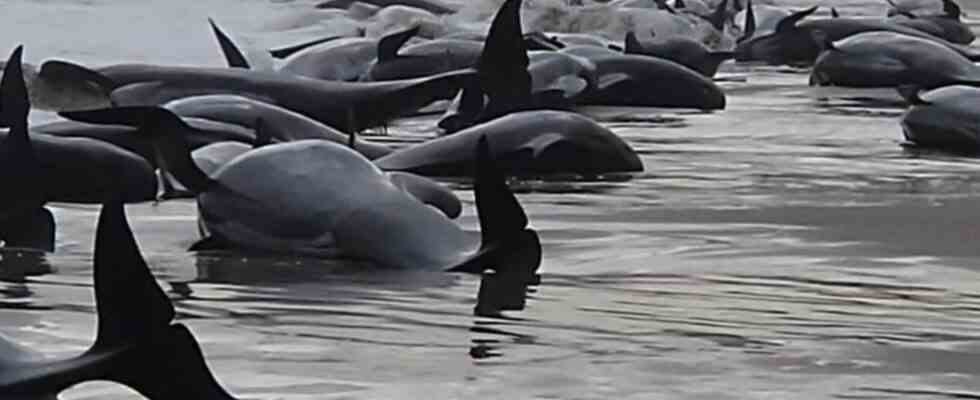Australia
Around 200 stranded whales have died in Tasmania
Beached whales at Macquarie Harbor in Strahan, Tasmania. Nearly 200 stranded whales have died off Tasmania’s west coast. photo
© Andrew Breen/Huon Aquaculture via AAP/dpa
Volunteers have worked tirelessly to save the lives of stranded whales on Ocean Beach. Many had already perished, but more than 30 initially managed to return to the sea. Still, there is concern.
After the mass stranding of 230 pilot whales in a bay on the Australian island of Tasmania, several dozen surviving marine mammals have been brought back to the open sea. About 200 of the animals died on Ocean Beach, only about 30 could have been saved, the local authorities said early Thursday evening (local time). Response teams had previously tirelessly moistened the whales’ bodies with buckets of water and wet towels. Australian media had reported a “race against the clock”.
The pilot whales (also known as pilot whales) were stranded in remote Macquarie Bay on the west of the island on Wednesday. According to eyewitnesses, half of them were still alive. As of Thursday morning, the number of survivors had shrunk to 35. Exactly two years ago, 470 pilot whales were stranded in the same bay, 111 of them survived.
Unlike in 2020, most of the whales were completely washed ashore this time, which is life-threatening for them. “Last time they were halfway in the water and had some buoyancy,” Brendon Clark of the Tasmania Parks and Wildlife Service told ABC. This time the rescue was much more difficult.
With heavy equipment back into the sea
Thanks to heavy equipment and boats, the emergency services were finally able to transport the surviving whales to the sea. However, the logistical challenge was enormous: Ocean Beach, where most of the animals stranded, is a 30-minute walk from the nearest parking lot.
The rescued animals were probably extremely stressed, said whale researcher Olaf Meynecke from Griffith University in Queensland of the German Press Agency. Some of the survivors may try to return to their stranded friends and family members, he explained. The reason is that pilot whales built extremely close bonds with each other. According to the authorities, two of the rescued had returned towards the shore by early evening.
Meanwhile, the timing of the stranding was not unusual: Pilot whales are at certain times – like now in the Australian spring and towards the end of winter – in large groups, explained whale researcher Meynecke. This increases the risk of mass stranding. “Some animals may be sick and stray into a bay with shallow water. Subgroups that the whales are friendly or related to will follow them – literally to the death.”

